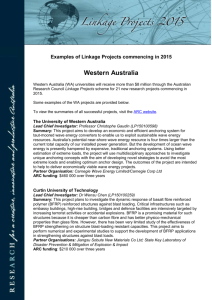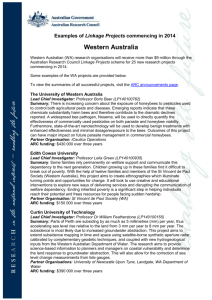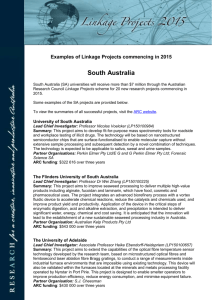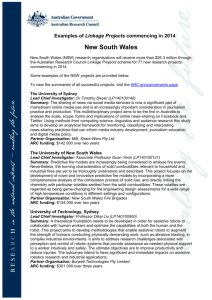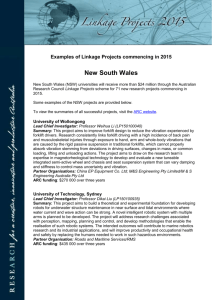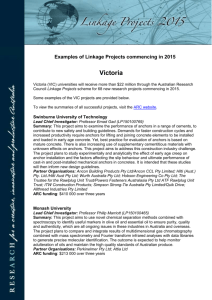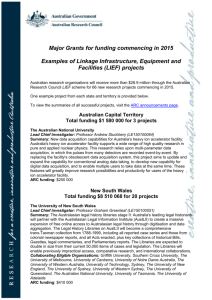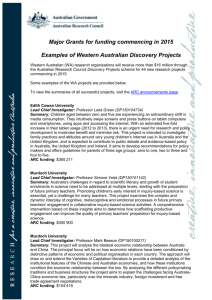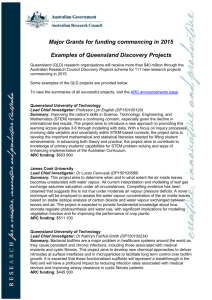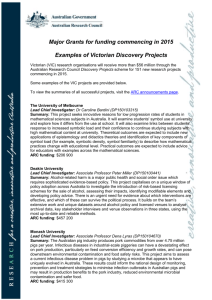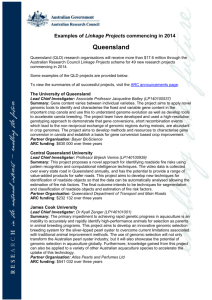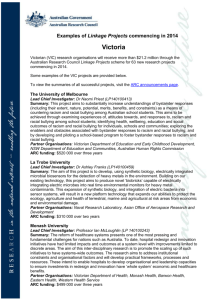Word Format - Australian Research Council
advertisement
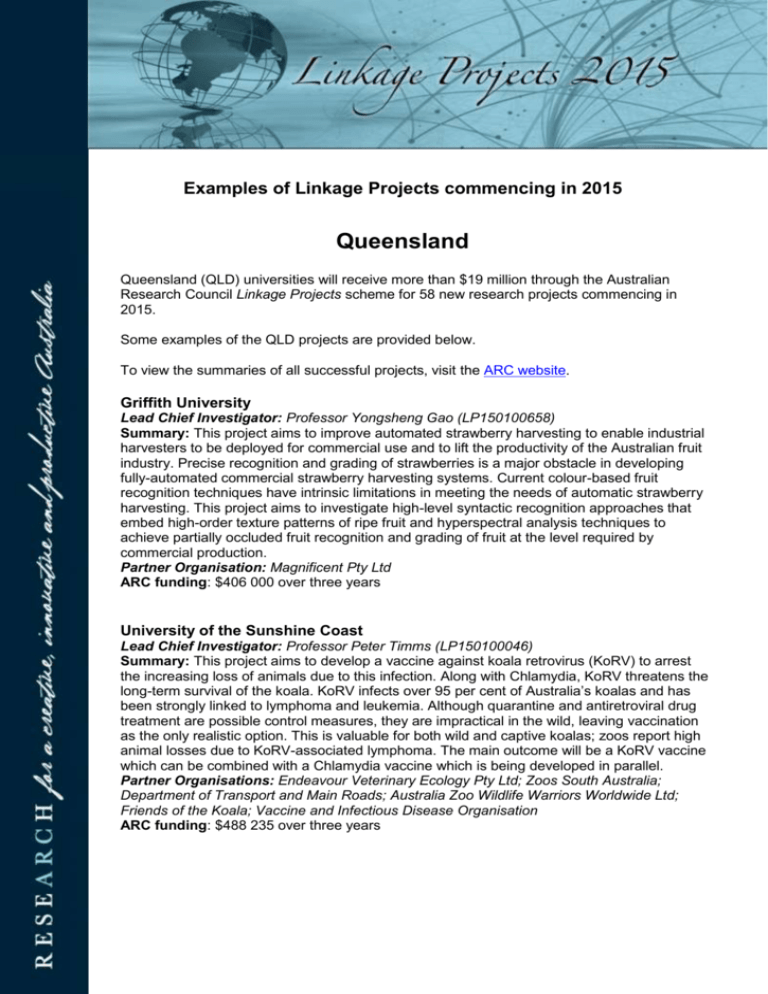
Examples of Linkage Projects commencing in 2015 Queensland Queensland (QLD) universities will receive more than $19 million through the Australian Research Council Linkage Projects scheme for 58 new research projects commencing in 2015. Some examples of the QLD projects are provided below. To view the summaries of all successful projects, visit the ARC website. Griffith University Lead Chief Investigator: Professor Yongsheng Gao (LP150100658) Summary: This project aims to improve automated strawberry harvesting to enable industrial harvesters to be deployed for commercial use and to lift the productivity of the Australian fruit industry. Precise recognition and grading of strawberries is a major obstacle in developing fully-automated commercial strawberry harvesting systems. Current colour-based fruit recognition techniques have intrinsic limitations in meeting the needs of automatic strawberry harvesting. This project aims to investigate high-level syntactic recognition approaches that embed high-order texture patterns of ripe fruit and hyperspectral analysis techniques to achieve partially occluded fruit recognition and grading of fruit at the level required by commercial production. Partner Organisation: Magnificent Pty Ltd ARC funding: $406 000 over three years University of the Sunshine Coast Lead Chief Investigator: Professor Peter Timms (LP150100046) Summary: This project aims to develop a vaccine against koala retrovirus (KoRV) to arrest the increasing loss of animals due to this infection. Along with Chlamydia, KoRV threatens the long-term survival of the koala. KoRV infects over 95 per cent of Australia’s koalas and has been strongly linked to lymphoma and leukemia. Although quarantine and antiretroviral drug treatment are possible control measures, they are impractical in the wild, leaving vaccination as the only realistic option. This is valuable for both wild and captive koalas; zoos report high animal losses due to KoRV-associated lymphoma. The main outcome will be a KoRV vaccine which can be combined with a Chlamydia vaccine which is being developed in parallel. Partner Organisations: Endeavour Veterinary Ecology Pty Ltd; Zoos South Australia; Department of Transport and Main Roads; Australia Zoo Wildlife Warriors Worldwide Ltd; Friends of the Koala; Vaccine and Infectious Disease Organisation ARC funding: $488 235 over three years The University of Queensland Lead Chief Investigator: Professor Chengzhong Yu (LP150101175) Summary: This project aims to develop a new nano-pesticide with improved safety and performance. Ticks and buffalo fly cause over $400 million each year in economic losses to the Australian livestock industry and are currently treated with highly toxic synthetic pesticides. Spinosad, a naturally derived pesticide with low environmental impact and low toxicity, will be loaded into silica hollow spheres which will improve adhesion to skin or hair and protect against ultraviolet degradation. The nano-spinosad pesticide is expected to have enhanced efficacy and effective duration in field conditions compared to conventional pesticides, significantly reducing the cost of pest control. Partner Organisation: Elanco Animal Health ARC funding: $330 000 over three years James Cook University Lead Chief Investigator: Professor Lin Schwarzkopf (LP150100675) Summary: This project aims to use novel acoustic techniques to detect and capture invasive frog species to protect native species. Invasive frogs are an under-appreciated but serious ecological problem worldwide, because they are voracious predators and are often toxic to native species. Male frogs call to attract mates, and answer calls they hear. Using new acoustic technologies, these behaviours can be exploited to detect species and attract gravid females for removal. This project aims to combine an early warning system (electronic listening) and trap (calling and catching), which can be customised to any invasive frog, and use it to detect and remove cane toads, especially in low density populations. Partner Organisations: Anindilyakwa Land Council; Department of Land Resource Management ARC funding: $593 519 over three years Queensland University of Technology Lead Chief Investigator: Associate Professor Patrik Wikstrom (LP150100156) Summary: This project aims to conduct a comprehensive and systematic examination of changing music consumption patterns in Australia in an era of digital downloads. Based on a comprehensive longitudinal dataset on music use in Australia provided by industry partners, the project plans to use innovative computational methods to develop and test evidencebased models for generating, sharing and distributing music revenues. It also plans to examine the current and future uses of music usage data in decision-making processes in music organisations, as well as the potential consequences of such use for practitioners and industry stakeholders. The project aims to support the future growth of the Australian music industry. Partner Organisations: Nightlife Music Pty Ltd/Nightlife Music Video Pty Ltd; D-Star Music Delivery Pty Ltd; Australasian Performing Right Association Ltd/APRA ARC funding: $274 139 over three years Griffith University Lead Chief Investigator: Dr Mathew Burke (LP150100078) Summary: This project aims to develop property value capture schemes that would provide alternative funding for public transport infrastructure. It plans to model the timing and spatial patterns of property value uplift from recent investments in rail, busways and ferries in Queensland and New South Wales. It then intends to conduct a survey of Australian stakeholders and discrete choice modelling to determine willingness-to-pay. This data is then expected to be used to develop an institutionally, legally and politically feasible scheme for implementation in Australia, focused on cases including extension to the Gold Coast light rail network. Partner Organisations: Gold Coast City Council/Council of the City of the Gold Coast; Department of Transport and Main Roads; Transport for NSW; Queensland Airports Limited ARC funding: $217 964 over four years The University of Queensland Lead Chief Investigator: Professor Michael Bennett (LP150100669) Summary: The project aims to answer key questions about the biology, ecology and sustainability of the world’s manta ray species to provide the information and tools for management and conservation of these charismatic and valuable species. In particular, the project aims to determine the likely impact of climate variability and fisheries that operate to Australia’s north on manta-based ecotourism in the Indo-Pacific region, as climate change and active low-value fisheries may both jeopardise a high-value ecotourism industry. The project seeks to explore geographic distributions, local and large-scale movements, population sizes, structure, and inter-connectivity in the region to assess the effect of climate and fisheries on manta ray populations. Partner Organisations: Austral Fisheries Pty Ltd; Earthwatch Institute; Lady Elliot Island Eco Resort; Ningaloo Marine; TG Kalis Marine Conservation Fund ARC funding: $315 236 over three years University of Southern Queensland Lead Chief Investigator: Professor Helen Partridge (LP150100456) Summary: With over 111 million annual visits, libraries are fundamental to Australia's social fabric and increasingly to its success as a national economy. In the current volatile economic climate Australia's libraries are being called upon to do more with less. This project aims to help Australia's libraries to contribute in a more powerful way to national productivity by helping library and information professionals make tough decisions in an environment where there is competition for limited resources. This project aims, for the first time, to build an evidence base on research in Australia's library and information profession. It will establish a framework that can be used by library and information professionals to build a research culture that enables the adoption of "practitioner-researcher" as an approach to professional practice. Partner Organisations: Australian Library and Information Association Ltd; State Library of New South Wales ARC funding: $219 959 over three years
